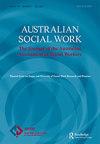Indigenisation, (De)Colonisation, and Whiteness: Dismantling Social Work Education
IF 2
3区 社会学
Q2 SOCIAL WORK
引用次数: 1
Abstract
ABSTRACT Education and knowledge sharing has a long and rich history within Australia prior to, and since invasion. Aboriginal and Torres Strait Islander peoples have always been committed to truth telling and ways of knowing, being, and doing. The process of decolonisation through the implementation of Aboriginal and Torres Strait Islander knowledges and pedagogy is an ongoing commitment in higher education settings and is especially relevant in social work education and practices. Social work has historically been complicit in the oppression and genocide of Aboriginal and Torres Strait Islander peoples and, as a result, continues to struggle to define itself within an Australian context. Through our experiences in higher education settings, we have found the process of decolonising education practices in social work to be challenging but necessary. This review aims to explore and reflect upon current literature that addresses western-centric social work pedagogical practice in Australia and aims to incorporate Aboriginal and Torres Strait Islander epistemologies using a positional and narrative lens. IMPLICATIONS Engaging Aboriginal and Torres Strait Islander knowledges and pedagogy decolonises social work education and practice. Decolonising social work pedagogy positions social work practice to reflect on the intersectionality of Aboriginal and Torres Strait Islander peoples without othering within contemporary Australia. Positioning social work education within an Indigenous pedagogical framework provides a basis for future teaching practices and knowledge sharing.本土化、(去)殖民化和白人化:废除社会工作教育
摘要入侵前后,澳大利亚的教育和知识共享有着悠久而丰富的历史。原住民和托雷斯海峡岛民一直致力于讲述真相以及了解、存在和行动的方式。通过实施原住民和托雷斯海峡岛民的知识和教育法实现非殖民化的进程是高等教育环境中的一项持续承诺,在社会工作教育和实践中尤其重要。社会工作历来是对原住民和托雷斯海峡岛民的压迫和种族灭绝的同谋,因此,它继续努力在澳大利亚的背景下定义自己。通过我们在高等教育环境中的经验,我们发现社会工作中教育实践的非殖民化过程具有挑战性,但也是必要的。这篇综述旨在探索和反思当前的文献,这些文献涉及澳大利亚以西方为中心的社会工作教学实践,并旨在通过位置和叙事的视角纳入原住民和托雷斯海峡岛民的认识论。原住民和托雷斯海峡岛民的知识和教育使社会工作教育和实践非殖民化。社会工作教学法的非殖民化定位了社会工作实践,以反映原住民和托雷斯海峡岛民的交叉性,而不是当代澳大利亚的其他人。在土著教学框架内定位社会工作教育为未来的教学实践和知识共享奠定了基础。
本文章由计算机程序翻译,如有差异,请以英文原文为准。
求助全文
约1分钟内获得全文
求助全文
来源期刊

Australian Social Work
SOCIAL WORK-
CiteScore
4.20
自引率
16.70%
发文量
37
期刊介绍:
Australian Social Work is an international peer-reviewed journal reflecting current thinking and trends in Social Work. The Journal promotes the development of practice, policy and education, and publishes original research, theoretical papers and critical reviews that build on existing knowledge. The Journal also publishes reviews of relevant professional literature, commentary and analysis of social policies and encourages debate in the form of reader commentary on articles. Australian Social Work has grown out of the Australian context and continues to provide a vehicle for Australian and international authors. The Journal invites submission of papers from authors worldwide and all contributors are encouraged to present their work for an international readership.
 求助内容:
求助内容: 应助结果提醒方式:
应助结果提醒方式:


